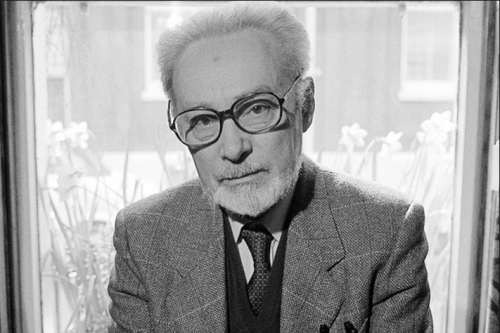Italy - Primo Levi

Primo Levi - Post War Portrait
Primo Levi was born on July 31, 1919, in Turin, Italy. He was the eldest of two children, born to middle-class Italian-Jewish parents, whose ancestors had settled in Italy centuries earlier to escape the Spanish Inquisition. In 1937, Primo Levi completed his primary schooling and entered the University of Turin. With the help of a sympathetic Professor Dr. Nicola Dallaporto he was able to complete his studies and in 1941, he graduated with an honours degree in chemistry.
Using a false identity and forged papers, he found employment as a chemist with a mining company and then worked for a Swiss pharmaceutical company in Milan. He returned to Turin after his father died in 1942. A year later in 1943, Primo Levi, his mother and sister fled to the hills of Amay, and he joined an Italian resistance group. He was arrested by Fascist forces and he was incarcerated in the camp at Fossoli di Capri, near Modena.
On February 22, 1944, he was deported by the Germans, who had taken control of the camp from the Italians. He was deported to Poland and when he arrived at Auschwitz-Birkenau, he was tattooed with the prisoner number 174517. Primo managed to secure himself a position as an assistant in tthe I.G. Farben Buna-werke laboratory, that researched into the production of synthetic rubber.
Shortly before the camp was liberated by the Red Army, Primo became ill with scarlet fever and he was placed in the camp's hospital. This illness spared Primo Levi from the forced death marches, and it was in the hospital that he was liberated by the Russian Army on January 27, 1945.
Primo Levi returned to Turin and he found work at the Duco paint factory which was part of the Du Pont company. There he started to write the first draft of his book, 'If this Is A Man,' which was published in Italy in October 1947. He married Lucia Morpurgo and they had two children, Lisa and Renzo, and he left his job to concentrate on writing. In 1975, his book, 'The Periodic Table' was published in Italy. The book was a collection of twenty-one autobiographical stories that each use a chemical element as its starting point. The accounts covered everything from Primo Levi's childhood, schooling, his stay in Auschwitz and his life after being liberated from the death camp. This book was critically acclaimed as his finest work. In 1986, he published his last work, 'The Drowned and Saved,' once again covering his life and his experiences.
On April 11, 1987, the concierge in his apartment building, where Primo Levi had been born and lived for most of his life, found him dead at the bottom of the stairwell. The coroner ruled that his death was suicide. Some of those who knew Primo Levi well maintained his death was an accident, saying that he had suffered recently from dizzy spells.
Sources
Chris Webb, The Auschwitz Concentration Camp, History, Biographies, Remembrance, ibidem verlag, Stuttgart 2018
© Holocaust Historical Society, December 9, 2023

